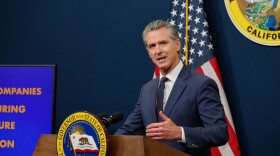President Obama sought Monday to mend strained ties with Turkey, a key NATO ally, praising the Muslim-dominated nation's secular democracy and firmly backing its desire to become a member of the European Union.
On a two-day visit to Turkey, Obama addressed the Parliament in the capital of Ankara, acknowledging that the invasion of Iraq, which the Turkish government opposed, had damaged ties.
"I know there have been difficulties these last few years," the president said. "Let me say this as clearly as I can: The United States is not at war with Islam. In fact, our partnership with the Muslim world is critical in rolling back a fringe ideology that people of all faiths reject."
Turkey, which borders Iraq, barred U.S. forces from using its territory for the 2003 invasion that eventually toppled Saddam Hussein. Ankara was especially fearful that its own stability could be threatened by the invasion, which energized Kurdish separatists both inside Turkey and in northern Iraq.
After arriving in Turkey, Obama paid tribute to Mustafa Kemal Ataturk, the founder of the modern nation, which formed in the wake of the collapse of the Ottoman Empire after World War I. The visit reinforces the new administration's view that Turkey is an important link to the Muslim world as the U.S. increases troop levels in Afghanistan and tries to persuade Iran to abandon its nuclear ambitions.
"Turkey is a critical ally. Turkey is an important part of Europe. And Turkey and the United States must stand together — and work together — to overcome the challenges of our time," the president said, calling the country's strong secular democracy its greatest legacy.
In an earlier joint news conference with Turkey's President Abdullah Gul, Obama stood by his assertion during the presidential campaign that Ottoman Turks carried out widespread killings of Armenians early in the 20th century, but stopped short of repeating the word "genocide." The issue is extremely sensitive and divisive throughout the region, and Obama sought to move beyond it, saying "history, unresolved, can be a heavy weight."
"I know there are strong views in this chamber about the terrible events of 1915," he told Turkish lawmakers. "While there has been a good deal of commentary about my views, this is really about how the Turkish and Armenian people deal with the past."
He also alluded to the need to resolve a long-running conflict on Cyprus, which has been divided between Turks and Greeks since a coup and civil unrest in the 1970s cut the island in two.
Obama called Turkey, with its strategic position between Europe and the Asian continent, a "place where civilizations meet," and he voiced strong support for its inclusion in the European Union.
"Turkey is bound to Europe by more than bridges over the Bosporus," he said. "Centuries of shared history, culture and commerce bring you together. Europe gains by diversity of ethnicity, tradition and faith — it is not diminished by it. And Turkish membership would broaden and strengthen Europe's foundation once more."
The American president also highlighted the regional challenges that lie ahead, reiterating his challenge, issued over the weekend in Prague, for all nations to eliminate nuclear weapons.
"This part of the world has known enough violence. It has known enough hatred. It does not need a race for ever-more powerful tools of destruction," he said.
"The choices that we make in the coming years will determine whether the future will be shaped by fear or by freedom; by poverty or by prosperity; by strife or by a just, secure and lasting peace," he said.
Copyright 2022 NPR. To see more, visit https://www.npr.org. 9(MDAzMjM2NDYzMDEyMzc1Njk5NjAxNzY3OQ001))





